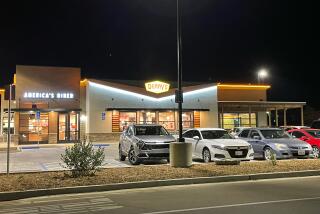Private Firm Will Go Public With Doughnut Shops to Reduce Debt : Denny’s Plans to Spin Off Winchell’s Unit
Denny’s Inc., the coffee house chain that was taken private in a management buyout nearly two years ago, said Friday that it is spinning off to the public its Winchell’s Donut Houses to raise cash.
Roger Mercier, chairman of Winchell’s, said the sale of limited partnership units in the doughnut company would raise $83.7 million, which would be used to reduce Denny’s bank debt. Denny’s borrowed nearly $753 million from a consortium of 15 banks about two years ago, when the company was acquired by an investment group led by Denny’s management and Merrill Lynch.
‚ÄúThis frees Winchell‚Äôs from Denny‚Äôs debt and allows it to address certain growth issues,‚ÄĚ Mercier said. He said that Winchell‚Äôs intends to expand its franchise network and move ahead with plans to broaden Winchell‚Äôs menu to attract customers all day--not just at breakfast.
Mercier, who is also general counsel to Denny’s, declined to reveal the size of Denny’s debt but said in response to a question that La Mirada-based Denny’s was under no pressure to reduce its debt. He said that Denny’s decision to sell ownership in Winchell’s was in part motivated by the favorable tax treatment that limited partnerships will receive under tax code revisions that go into effect next year.
Denny’s said it will sell to the public a 58% stake in Winchell’s, or 5 million limited partnership shares, at $18 a share. Denny’s said it would retain effective control of the Winchell’s operations by keeping a 42% stake in the doughnut shop chain.
Denny’s operates the largest coffee shop chain in the nation, and its Winchell’s Donut Houses chain is the second-largest doughnut chain next to Randolph, Mass.-based Dunkin Donuts Inc.
Winchell’s operates 740 doughnut shops in 14 Western states. More than half those shops, or 466 of them, are located in California, where Winchell’s is the leading doughnut chain.
Most of its competition comes from independent doughnut shops and fast-food chains that offer breakfast.
According to the registration statement filed by Winchell’s with the Securities and Exchange Commission, Winchell’s earned $6.81 million on sales of $180 million for the year that ended on June 30. A year earlier, Winchell’s earned $6.57 million on sales of $193.8 million.
Winchell’s said that it plans to pay out most of its income to its limited partners. It said it expected to pay out $1.80 next year for each unit but couldn’t estimate how much it would pay out after that.
The doughnut chain has recently undergone a restructuring, according to its registration statement. It sold 91 doughnut shops in unprofitable markets in Illinois, Minnesota, Ohio and Texas during the fiscal year that ended on June 30, 1986.
Winchell’s also started offering doughnut shop franchises during the last fiscal year as a way of expanding into new markets. It currently has 22 franchised locations in seven states.
Winchell’s also said in its filing that it is tinkering with its menu to draw customers during the afternoon and early evening, when doughnut sales are generally weak.
At some locations, the company has recently started selling other baked goods such as brownies, crumb cakes, banana nut bread and croissants to attract non-breakfast customers, according to Winchell’s registration statement.
The company has also started selling doughnuts wholesale on an experimental basis to convenience stores operated by Arco and Circle K Corp.
More to Read
Inside the business of entertainment
The Wide Shot brings you news, analysis and insights on everything from streaming wars to production ‚ÄĒ and what it all means for the future.
You may occasionally receive promotional content from the Los Angeles Times.










